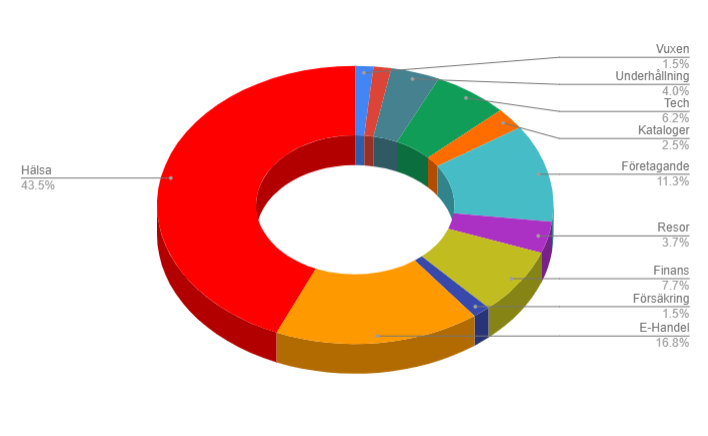
During the first week of August, Google launched its first major algorithm update in quite some time — at least the first one that has significantly impacted search results for many. After a few days, the SEO community named it the Google Medic Update. It appeared to hit sites related to medicine and health particularly hard.
Between August 1st and 5th, the Google Medic Update rolled out globally, and we can clearly see large effects on a number of Swedish sites. Many have gained positions in the search results, but just as many have lost them. Sites most affected have been within Health and Finance, with a strong emphasis on health. That is why it has come to be called what it is. Below is a chart with data from Search Engine Roundtable that illustrates the impact well.
Google has long talked about sites in the “Your Money or Your Life” category — sites that need extra scrutiny because of how much it can affect visitors if the information does not come from reliable sources. It is therefore natural that Google would launch some sort of “trustworthiness update” that primarily targets the Health and Finance segments.
How to handle the Medic Update?
If your site was significantly negatively affected during the first week of August, you may have been hit by the update’s negative effects. There are several interpretations of what Google has said, but there is currently no clear-cut solution for regaining lost rankings.
Google themselves claim that there is no solution — but they are clearly wrong here. If you change your site so that it complies with the algorithm’s requirements, you will of course regain positions, even if it may be complex. Unfortunately, from what we’ve seen so far, the solution also looks relatively complex.
Increase your visibility
The algorithm appears to favor well-known authors and strong brands. If your site contains content about finance or health, it is now even more important to show a trustworthy face behind it. If you don’t already have this, you need to build it, either by being cited and mentioned elsewhere or by making yourself more visible on the web. If you believe your brand is already fairly well-known but still suffered, there are ways to move forward.
It could be that the search engine fails to understand that you are indeed the recognized and respected author unless this is made explicit on your pages. For example, if you’ve written an in-depth article on your site about choosing index funds, make sure it is clear that you are the author. Add your name and photo in a byline, and ensure the same is done on other sites where your advice has been published.
Also work on things that distinguish strong brands. This does not necessarily mean huge changes — small things matter too. There are older authority signals worth leveraging. Make sure your company is listed in industry directories, with organizations in your field, and add a pin on Google My Business. Add some trust-inspiring badges to your site, such as an AAA-rating or official partnerships if you have them.
This is untested
Keep in mind that these measures have not yet been tested. The advice is based on observed differences between sites that were negatively affected by the update and those that benefited from it. No one has yet implemented these steps and reported verified positive outcomes, so it is not guaranteed to work. However, we have chosen to publish this since the impact on some sites is so significant that we believe it is better to act than to do nothing.
We would also like to wish the best of luck to all of you who were hit. Please share how your journey back goes.


